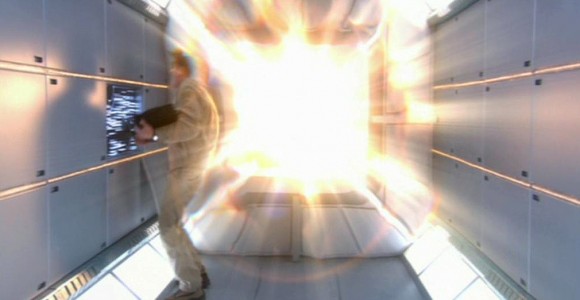Review
 EPISODE #206
EPISODE #206ORIGINAL AIR DATE: 08.19.2005
SYNDICATION AIR DATE: 10.23.2006
DVD DISC: Season 2, Disc 2
WRITTEN BY: Damian Kindler
DIRECTED BY: Martin Wood
Review by Taylor Brown
If "Duet" shows McKay's human side, "Trinity" shows the worst of him. But what this episode is really about is trust between the characters and what happens when that trust is lost. The thread of this theme keeps the two very different parts of the episode together and makes the story more complete overall.
The perfect power source that Project Arcturus presents is a tempting thing for both the civilian and military personnel of the Atlantis expedition, and the civilian/military dynamic that was constantly tested in the first season. Instead of tension between Weir and Sheppard's leadership styles, Weir comes up against Caldwell and his threats of the Pentagon overruling her decision, and the dissension over whether Arcturus should be used as a weapon or power source. Contrary to last season, Sheppard is one of the few people who can convince Weir otherwise once she's made a decision, and McKay turns to Sheppard -- with nothing but trust -- to make his appeal.
The episode starts on a positive note, complete with a montage of the scientists of Atlantis working (which also saves the viewer from extraneous techno-babble -- simple enough for my "Physics for Poets" level of understanding to make sense of what is going on). And then everything goes wrong: the chamber overloads, Collins joins Atlantis's version of Red Shirts, and the computers aren't responding. This is what you get for trying to run Ancient technology on Windows.
"Trinity" breaks the infallible McKay myth, as he is powerless to do anything several times in the episode. Instead of humbling him, the setbacks only make him more and more arrogant, until he ends up destroying five-sixths of a solar system. I wonder if there will be any fallout to this destruction other than McKay's failure and his need for others to believe in his abilities. What if that solar system was inhabited? This a little more serious that the lead scientist screwing up.
Zelenka is a great foil for McKay's constant condescension. As the scientist's de facto second-in-command and his friend, Zelenka tries to tell McKay that he can't possibly get Project Arcturus to work. He's more involved in this story than just to share the scientific exposition, and it balances McKay's blind overconfidence in this episode. Zelenka has come a long way from his first appearance in "Thirty Eight Minutes."
Ronon keeps on surprising me every week, and sometimes within the very same episode. The revelation that he is not the only survivor of the horrible Wraith attack on his homeworld changes Ronon's storyline in two distinct ways: he is not as much of the loner as he was, and the Wraith are not his only enemies. I was stunned when Ronon killed Kell, as he hides his displeasure from his old friend when Solen mentions that Kell is alive during their celebration. Either I missed something big, or Ronon has the best poker face I've ever seen.
"Trinity" is also Teyla's strongest episode so far this season. Her various sides as a member of the Atlantis team, a leader, and a friend are all present here. She is not just the alien member of the team, and knows that the Atlantis team will not always understand or approve of how things work in the Pegasus Galaxy. As a friend to Ronon, she is his guide to return to a life not only based on survival.
But when Ronon breaks her trust by killing Kell, she makes it clear to him that he can't use her friendship for his own vengeance. In one episode, Teyla has become more of a fully-formed character than all of last season. I'm glad it did not get lost in the rest of the episode.
But why is this episode called "Trinity?" The project is called "Arcturus" and there is no mention of any triumvirate. So why "Trinity?" The answer has something to do with the young scientist from history who McKay invokes to get Sheppard to reconsider. "Trinity" was the name of the first nuclear test in New Mexico in 1945. It's less obvious than most Atlantis titles, but it serves the story well.
This episode is the most complete so far this season. "Trinity" balances both plots well and ties them together.
Rating: * * * 1/2



